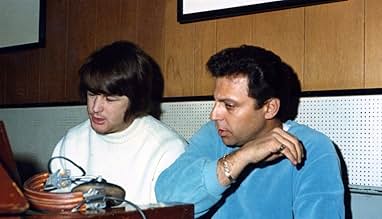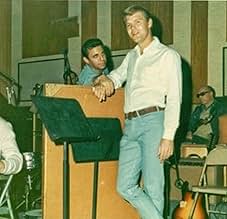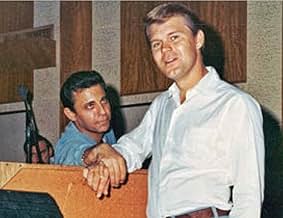Hal Blaine(1929-2019)
- Music Department
- Actor
- Camera and Electrical Department
Hal Blaine was an American drummer and session musician of Jewish descent, with a career that lasted about 70 years. He was born in 1929 as "Harold Simon Belsky", son to Meyer Belsky and Rose Silverman. Both of his parents were immigrants from Eastern Europe.
Blaine was born in Holyoke, Massachusetts, a planned city that was once famed for its paper mills. He became interested in music as a child, and started playing drums as a hobby when 8-years-old. In 1943, the 14-year-old Blaine and his family moved to California. From 1949 to 1952, received lessons in drumming by Roy Knapp, the same music teacher who had trained the famed jazz drummer Gene Krupa (1909-1973). Meanwhile, Blaine started performing professionally in Chicago strip clubs. He worked on improving his sight-reading skills, reading and performing of pieces of music or songs in music notation that the performer has not seen before.
He started out as a jazz musician. He served for a while in the big band of Count Basie (1904-1984), and went on music tours with Patti Page (1927-2013) and Tommy Sands (1937-). But he also enjoyed the emerging "rock and roll" of the 1950s, and performed as a session musician in rock recordings.
In the 1960s, Blaine served as a core member of "the Wrecking Crew", a loose collective of session musicians working in Los Angeles. Most of them had formal training in both jazz and classical music, and provided their music skills to record companies producing various rock, pop, and rhythm and blues recording of this era. While relatively unknown to the music audience, the Wrecking Crew were viewed with reverence by industry insiders.
From 1962 to 1976, Blaine played drums for 40 recordings that hit number 1 in the Billboard Hot 100, in what was probably the most memorable period of his career. These recordings included "Johnny Angel" (1962, by Shelley Fabares), "He's a Rebel" (1962, by The Crystals), "Surf City" (1963, by Jan & Dean), "I Get Around" (1964, by The Beach Boys ), "Everybody Loves Somebody" (1964, by Dean Martin), "Ringo" (1964, by Lorne Greene), "This Diamond Ring" (1965, by Gary Lewis & the Playboys), "Help Me, Rhonda" (1965, by The Beach Boys), "Mr Tambourine Man" (1965, by The Byrds), "I Got You Babe" (1965, by Sonny & Cher), "Eve of Destruction" (1965, by Barry McGuire), "My Love" (1966, Petula Clark), "These Boots Are Made for Walkin'" (1966, by Nancy Sinatra), "Monday, Monday" (1966, by The Mamas & the Papas), "Strangers in the Night" (1966, by Frank Sinatra), "Poor Side of Town" (1966, by Johnny Rivers), "Good Vibrations" (1966, by The Beach Boys), "Somethin' Stupid" (1967, by Frank & Nancy Sinatra), "The Happening" (1967, by The Supremes), "Windy" (1967, by The Association), "Mrs. Robinson" (1968, by Simon & Garfunkel), "Dizzy" (1969, by Tommy Roe), "Aquarius/Let the Sunshine In" (1969, by The 5th Dimension), "Love Theme from Romeo and Juliet" (1969, by Henry Mancini), "Wedding Bell Blues" (1969, by The 5th Dimension), "Bridge Over Troubled Water" (1970, by Simon & Garfunkel), "(They Long to Be) Close to You" (1970, by The Carpenters), "Cracklin' Rosie" (1970, by Neil Diamond), "I Think I Love You" (1970, by The Partridge Family), "Indian Reservation" (1971, by The Raiders), "Song Sung Blue" (1972, by Neil Diamond), "Half Breed" (1973, by Cher), "Top of the World" (1973, by The Carpenters), "The Way We Were" (1974, by Barbra Streisand), "Annie's Song" (1974, by John Denver), "Thank God I'm a Country Boy" (1975, by John Denver), "Love Will Keep Us Together" (1975, by Captain & Tennille), "I'm Sorry"/"Calypso" (1975, by John Denver), and "Theme from Mahogany (Do You Know Where You're Going To)" (1976, by Diana Ross).
Blaine's career declined considerably in the 1980s. The drum machine, an electronic musical instrument that creates percussion, became popular in the music industry. This largely eliminated the recording studios' demand for session drummers. Blaine found himself competing for work with musicians much younger than himself. He kept on working, by performing music for advertising jingles. Due to the decline in his personal finances, he took various odd jobs to supplement his income. At one point, he worked as a security guard.
Late in life, Blaine received some music industry recognition for his decades of solid work. He was inducted into the Rock and Roll Hall of Fame as a sideman in 2000, inducted into the the Modern Drummer Hall of Fame in 2010, and received a Grammy Lifetime Achievement Award in 2018.
In 2019, Blaine died in Palm Desert, California, due to unspecified "natural causes". He was 90-years-old. His former colleague Brian Wilson (1942-) commemorated his death with statements of praise for Blaine's music skills.
Blaine was born in Holyoke, Massachusetts, a planned city that was once famed for its paper mills. He became interested in music as a child, and started playing drums as a hobby when 8-years-old. In 1943, the 14-year-old Blaine and his family moved to California. From 1949 to 1952, received lessons in drumming by Roy Knapp, the same music teacher who had trained the famed jazz drummer Gene Krupa (1909-1973). Meanwhile, Blaine started performing professionally in Chicago strip clubs. He worked on improving his sight-reading skills, reading and performing of pieces of music or songs in music notation that the performer has not seen before.
He started out as a jazz musician. He served for a while in the big band of Count Basie (1904-1984), and went on music tours with Patti Page (1927-2013) and Tommy Sands (1937-). But he also enjoyed the emerging "rock and roll" of the 1950s, and performed as a session musician in rock recordings.
In the 1960s, Blaine served as a core member of "the Wrecking Crew", a loose collective of session musicians working in Los Angeles. Most of them had formal training in both jazz and classical music, and provided their music skills to record companies producing various rock, pop, and rhythm and blues recording of this era. While relatively unknown to the music audience, the Wrecking Crew were viewed with reverence by industry insiders.
From 1962 to 1976, Blaine played drums for 40 recordings that hit number 1 in the Billboard Hot 100, in what was probably the most memorable period of his career. These recordings included "Johnny Angel" (1962, by Shelley Fabares), "He's a Rebel" (1962, by The Crystals), "Surf City" (1963, by Jan & Dean), "I Get Around" (1964, by The Beach Boys ), "Everybody Loves Somebody" (1964, by Dean Martin), "Ringo" (1964, by Lorne Greene), "This Diamond Ring" (1965, by Gary Lewis & the Playboys), "Help Me, Rhonda" (1965, by The Beach Boys), "Mr Tambourine Man" (1965, by The Byrds), "I Got You Babe" (1965, by Sonny & Cher), "Eve of Destruction" (1965, by Barry McGuire), "My Love" (1966, Petula Clark), "These Boots Are Made for Walkin'" (1966, by Nancy Sinatra), "Monday, Monday" (1966, by The Mamas & the Papas), "Strangers in the Night" (1966, by Frank Sinatra), "Poor Side of Town" (1966, by Johnny Rivers), "Good Vibrations" (1966, by The Beach Boys), "Somethin' Stupid" (1967, by Frank & Nancy Sinatra), "The Happening" (1967, by The Supremes), "Windy" (1967, by The Association), "Mrs. Robinson" (1968, by Simon & Garfunkel), "Dizzy" (1969, by Tommy Roe), "Aquarius/Let the Sunshine In" (1969, by The 5th Dimension), "Love Theme from Romeo and Juliet" (1969, by Henry Mancini), "Wedding Bell Blues" (1969, by The 5th Dimension), "Bridge Over Troubled Water" (1970, by Simon & Garfunkel), "(They Long to Be) Close to You" (1970, by The Carpenters), "Cracklin' Rosie" (1970, by Neil Diamond), "I Think I Love You" (1970, by The Partridge Family), "Indian Reservation" (1971, by The Raiders), "Song Sung Blue" (1972, by Neil Diamond), "Half Breed" (1973, by Cher), "Top of the World" (1973, by The Carpenters), "The Way We Were" (1974, by Barbra Streisand), "Annie's Song" (1974, by John Denver), "Thank God I'm a Country Boy" (1975, by John Denver), "Love Will Keep Us Together" (1975, by Captain & Tennille), "I'm Sorry"/"Calypso" (1975, by John Denver), and "Theme from Mahogany (Do You Know Where You're Going To)" (1976, by Diana Ross).
Blaine's career declined considerably in the 1980s. The drum machine, an electronic musical instrument that creates percussion, became popular in the music industry. This largely eliminated the recording studios' demand for session drummers. Blaine found himself competing for work with musicians much younger than himself. He kept on working, by performing music for advertising jingles. Due to the decline in his personal finances, he took various odd jobs to supplement his income. At one point, he worked as a security guard.
Late in life, Blaine received some music industry recognition for his decades of solid work. He was inducted into the Rock and Roll Hall of Fame as a sideman in 2000, inducted into the the Modern Drummer Hall of Fame in 2010, and received a Grammy Lifetime Achievement Award in 2018.
In 2019, Blaine died in Palm Desert, California, due to unspecified "natural causes". He was 90-years-old. His former colleague Brian Wilson (1942-) commemorated his death with statements of praise for Blaine's music skills.

























